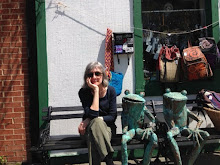Once, years ago, while I sat quietly in a forest in Central Massachusetts, a thought came to me so clearly it was as if I heard it said out loud: Love everyone, yourself included. That is work enough for a lifetime. At the time, I think I most needed to hear the “yourself included” part. Lately, though, I find that the “love everyone” message is more compelling.
What
is love? The question has occupied poets, philosophers, dreamers and
song-writers throughout human history. Try to define it and you run smack into
one of the most profound mysteries of the human experience. But I want to
define it, because the love we yearn for is not about “chemistry,” or
infatuation, or lust, or obsession. The love we yearn for is not even about
“liking.”
What is love? Love is not a feeling. Love is not an abstract concept. Love is a
verb. Love is something we do. So here is my working definition of love:
Love is radically accepting, and nurturing the growth of, a human being.
The “radically accepting” emerges from a deep trust, an orientation of the
heart that values the preciousness of each person. I use the word radical for
its original meaning, of or having to do with roots. But it is also radical in
the sense of being profoundly counter-cultural in our society. And the
nurturing refers to all that we do to manifest that radical acceptance. I may
feel a loving trust, but if I don’t do anything then it isn’t love.
When I say that I love every one of your children, on a fundamental level I am
not talking about how I feel. I am talking about the energy I put into
deeply listening to and supporting and encouraging and nurturing every one of
your children. Regardless of their behavior, regardless of their mood,
regardless of their appearance. It is a commitment of energy that is
intentionally counter-cultural, in a culture that is so harshly judgmental of
behavior, mood, and appearance.
It is a commitment that I have made to love every one of you as well, a
commitment that I am reaffirming today. This is not a commitment that is
inherent in the role of rabbi. There may be rabbis who would not explicitly
name love as a central task in their job description. But I do.
Now that I’ve insisted that love is something we do, let me backtrack a little
and admit that there is also an emotional component, but not in the way that
our culture usually portrays love. The emotional component is joy.
How astonishing would it be if every one of us made that commitment to
radical love? In order to love one another, we would need to find the will to
get around all the obstacles, the forces that drain our soul energy: the forces
of busy-ness, exhaustion, isolation, addiction, anxiety, depression, despair,
and doubt. A daunting challenge. But it can be done.
What would it take to love more? It begins with listening. “True listening is
love in action.” [M. Scott Peck, The Road Less Traveled] We can listen
to understand one another’s experiences; and we can listen at the soul level,
which happens not just with our ears. True listening is an expression of
compassion, because our heart is called to resonate with the heart of the
person we are listening to. And true listening is an expression of humility,
because we are called to set aside our own ego needs, opinions, and habits of
the mind.
What else would it take to love more? Active love requires other forms of
giving besides the giving of attention. In Erich Fromm’s book The Art of
Loving -- a book that I first read in my twenties and which profoundly
influenced the trajectory of my life -- Fromm describes what a person is doing
when they are loving another person:
“He gives... of that which is alive in him, he gives… of his joy, of his
interest, of his understanding, of his knowledge, of his humor, of his sadness
-- of all expressions and manifestations of that which is alive in him…. Giving
is in itself exquisite joy.”
What else would it take to love more? It would also take a willingness to let
someone listen to us. A willingness to be vulnerable. A willingness to be
broken and not have it all together. A willingness to be loved. How many times have you had the experience of reaching out to someone who is
suffering only to be told, “It’s okay, I’m fine”? It happens to me all the
time. I know that I have been guilty of doing the same thing at times. It’s
worth reflecting on why we do that, and what we might do to push back against
that cultural norm.
Finally, remember this: To love in this way is also to risk disappointment and
hurt. To love does not insure that the beloved will grow in the direction that
we had hoped or dreamed. To love is to stay mindful of our fantasies and
expectations, and to let them go, again, and again, and again.
Love everyone, yourself included. That is work enough for a lifetime. And
by committing to love, we can do our part to fix what’s broken in this
crazy-making world -- generating more joy in the process.
[excerpted from a sermon I gave a few years ago]
